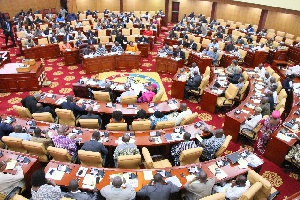 File photo: Parliament of Ghana
File photo: Parliament of Ghana
It would appear that Ex-President Mahama is not enthused about the insertion of the obvious democratic contradiction indemnity clause in Ghana’s 1992 Constitution, judging from his recent pronouncements.
Indeed, the indemnity clause is unjust and incommodious, so let us review it. Let us amend or expunge the incongruous and irrational indemnity clause and replace it with an innovative and expedient law.
Until such time, Ex-President Mahama should not waste his time beseeching President Akufo-Addo to arrest, investigate and prosecute him (Mahama) in respect of his alleged ill-gotten wealth.
In the wisdom of the framers of Ghana’s 1992 Constitution, the insertion of the controversial and somewhat inexpedient indemnity clause was to “let the sleeping dogs lie” and move on with our lives.
To me, Ghana’s Constitution has to be reviewed further and the unconscionable clauses such as the indemnity clause are either amended or expunged accordingly.
How on earth can individuals commit unpardonable crimes (sleazes and gargantuan corruptions) against the state and get away with their misdeeds?
And more so the traditional exemption of heads of state from prosecution despite the evidence of a case to answer is wrong.
And how serious are we as a nation when we can only descend heavily on goat, cassava and plantain thieves, and let go hard criminals who persistently dip their hands into the national purse as if there is no tomorrow?
Elsewhere, though, both past and incumbent heads of state may face the laws without any recourse to their status.
Take, for example, in recent times, the controversial South Korean president, Park Geun-hye, found herself in a wide-ranging corruption and cronyism scandal, which culminated in her removal from office in March 2017 (guardian.co.uk, 2017).
And, more recently, former Brazilian president, Luiz Inacio Lula Da Silva, who has been cited as the most famous president in Brazil’s contemporary history, has been sentenced to nine years and six months in jail after being found guilty on corruption and money-laundering charges (Source: guardian.co.uk, 12/07/2017).
In recent times, Ex-President John Dramani Mahama has been challenging President Akufo-Addo to arrest, investigate and prosecute him and any member of his family, if there is unobjectionable evidence to suggest that they amassed wealth illegally during his time in office (See: ‘Jail me! Mahama dares Nana; dailyguideafrica.com/ghanaweb.com, 24/03/2018).
Apparently, in a recent NDC gathering at a secret location in London, Ex-President Mahama dared President Akufo-Addo to take over his (Mahama’s) alleged offshore properties (See: Take over my ‘hotel’ in Dubai – Mahama dares Akufo-Addo; kasapafmonline.com/ghanaweb.com, 21/03/2018).
Besides, a few months ago, former President Mahama came out and told Ghanaians that he and his wife (Lordina) are not owners of DKM, and that any attempt to investigate them will hit the wall.
Former President Mahama asserted: “thankfully, they are now in power and I will want them to prosecute me and the first lady if it is true the DKM company belonged to us” (yen.com.gh).
It would appear that the framers of our Constitution were not guided by the tenets of the fundamental human rights when inserting the contentious indemnity clause in the 1992 Constitution.
It is, however, manifestly clear that the vast majority of discerning Ghanaians are against the insertion of the indemnity clause in the 1992 Constitution.
But despite the utter public outcry over the indemnity clause, Professor Albert K. Fiadjoe, the Chairman of the Constitution Review Commission (CRC) insisted that the removal of the controversial clause from the 1992 Constitution would lead to anarchy in the country.
“It means that all governments since 1966 are illegal, that we must immediately handover the reigns of government to the Convention Peoples Party, we will criminalize all those who have participated in governments since the overthrow of the first republic and would also bring unnecessary interruptions in national affairs.
“The removal of the indemnities could adversely affect the democratic dispensation because it would give the negative impression that the country is reneging on a settlement that it has previously accepted.
“This could seriously undermine stability in the country (Source: graphic.com.gh, 2012).”
In as much as the CRC’s reasons for the retention of the indemnity clause may be valid, there is no justification for the rabble rousers to keep all the alleged stolen monies.
In contrast toCRC’s disposition, it will, however, remain unfair, unconscionable and incommodious not to amend the unpopular indemnity clause to allow us to retrieve any possible stolen funds.
Given that excesses, disregard and contempt for human rights in the past military regimes culminated in inexcusable barbarous acts, in my opinion, the befitting retributive justice should have been prescribed instead of the irrational indemnity clause.
I am of the firm conviction that the transposition of proportionate punishment could have deterred potential coup makers and any greedy and corrupt individuals.
The all-important question then is: will the day come when “political criminals” find they have nowhere to hide?
K. Badu, UK.
k.badu2011@gmail.com